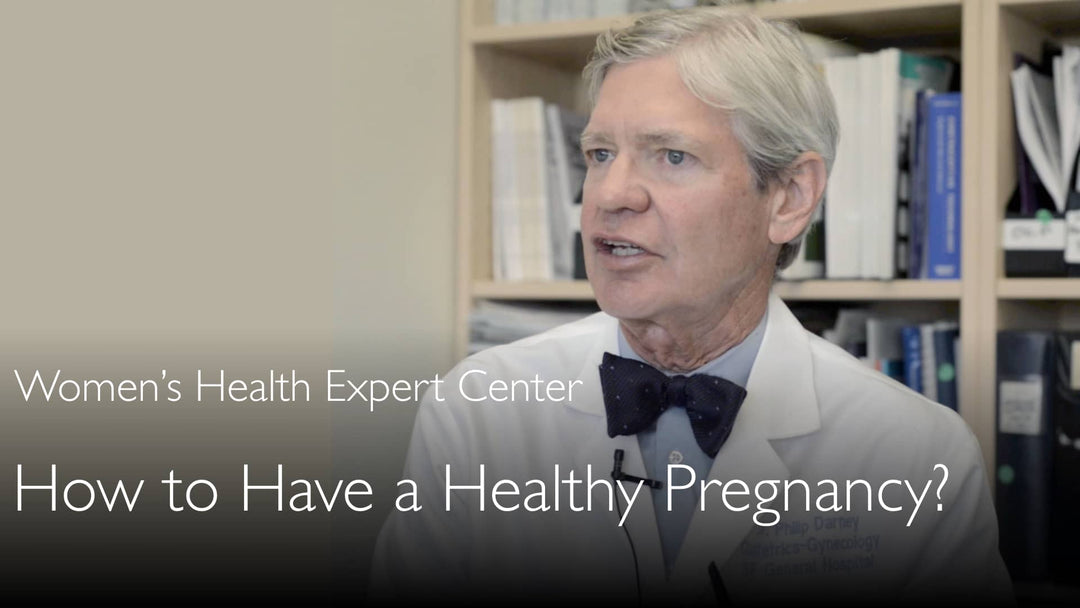Leading expert in obstetrics and gynecology, Dr. Philip Darney, MD, explains key strategies for a healthy pregnancy, emphasizing early prenatal care, avoiding harmful substances, and understanding age-related risks. The UCSF professor highlights how proactive measures and timely medical interventions can significantly improve pregnancy outcomes and fetal health.
Essential Steps for a Healthy Pregnancy and Baby: Expert Obstetric Advice
Jump To Section
- Optimal Age for Pregnancy
- Avoiding Alcohol, Smoking, and Toxins
- Importance of Early Prenatal Care
- Genetic Testing and Risk Assessment
- Sharing Family Medical History
- Managing Gestational Diabetes
- Being Proactive in Pregnancy Monitoring
- Full Transcript
Optimal Age for Pregnancy
Dr. Philip Darney, MD, stresses that maternal age significantly impacts pregnancy outcomes. Teen pregnancies carry higher risks of labor complications, while pregnancies after age 35 increase difficulties with conception and pregnancy-related complications. The UCSF obstetrician recommends planning pregnancies during the biologically optimal window of early 20s to mid-30s.
Avoiding Alcohol, Smoking, and Toxins
"These aspects are completely within the woman's control," emphasizes Dr. Darney. Eliminating alcohol, tobacco, and environmental toxins dramatically improves fetal development outcomes. Research shows these substances can cause low birth weight, developmental delays, and birth defects - all preventable through conscious avoidance during pregnancy.
Importance of Early Prenatal Care
Dr. Philip Darney, MD, advises scheduling the first prenatal visit immediately after a positive pregnancy test. Early medical supervision allows detection of conditions like gestational diabetes or preeclampsia when most treatable. Statistics show women receiving prenatal care in the first trimester have 50% lower risk of pregnancy complications.
Genetic Testing and Risk Assessment
The triple test and newer genetic screenings help identify fetal abnormalities, particularly important for women over 35. Dr. Philip Darney, MD, explains these non-invasive tests analyze maternal blood for markers indicating potential chromosomal conditions, with 85-90% detection rates for Down syndrome when performed between 15-20 weeks.
Sharing Family Medical History
"Disclose any family history of genetic disorders during your first visit," urges Dr. Darney. Inherited conditions like cystic fibrosis or congenital heart defects warrant specialized monitoring. The UCSF expert notes that 3-4% of pregnancies involve birth defects, many preventable or manageable with early intervention.
Managing Gestational Diabetes
Dr. Philip Darney, MD, highlights the value of second opinions for gestational diabetes diagnosis and treatment plans. This condition affects 2-10% of pregnancies and requires careful blood sugar control through diet, exercise, and sometimes medication to prevent complications like macrosomia (excessive fetal growth).
Being Proactive in Pregnancy Monitoring
While trusting medical professionals is essential, Dr. Darney encourages women to actively track pregnancy progress. Noticing changes in fetal movement, unusual symptoms, or test results allows timely intervention. The obstetrician concludes, "A mother's vigilance combined with expert care creates the healthiest outcomes."
Full Transcript
Dr. Anton Titov, MD: How to have a healthy pregnancy and give birth to a healthy baby?
It is important to visit a doctor as soon as you learn that you are pregnant. Early medical care can find signs of any potential problems during pregnancy. Many factors of a healthy pregnancy are under a woman's control.
Pregnancy brings not only excitement but also anxiety, especially during a first pregnancy. There are more contacts with medical professionals and more diagnostic tests. Women often fully entrust the management of pregnancy to medical professionals, as they should. But sometimes it is worth being proactive. A woman must be vigilant about how the pregnancy progresses.
Dr. Anton Titov, MD: You have enormous international experience in women's health. What can a woman do to ensure that her pregnancy goes well?
Dr. Philip Darney, MD: There's a lot women and families can do to ensure that pregnancy goes well. First is probably to avoid pregnancy at too young or too old an age. For example, women in their early teen years have more pregnancy complications, particularly in labor and delivery. Women beyond age 35 or 40 have more difficulty becoming pregnant and more complications with the pregnancy itself.
Another important aspect of protecting pregnancy is to avoid alcohol, smoking, and chemicals or toxins that could negatively influence pregnancy outcomes. Those aspects are completely within the control of the woman herself.
Sometimes complications develop that require medical intervention. The best method to identify complications is to seek prenatal care early in pregnancy. If complications occur, they are identified early.
For example, a woman's risk of genetic abnormalities in pregnancy increases with age. Pregnancy risks can be tested for and predicted. The genetic test widely used is called the triple test. There are more modern iterations of these diagnostic tests.
From simple pregnancy complication diagnostic tests, a woman can proceed to more complex investigations of the genetic makeup of the fetus.
Dr. Anton Titov, MD: Yes, that's a good example. A family history of genetic abnormalities would be important to tell a physician about. Share any family history of congenital malformations during an early prenatal visit.
Mother's health and early prenatal care are key to the health of the child.




